President Bush salutes Greek Independence
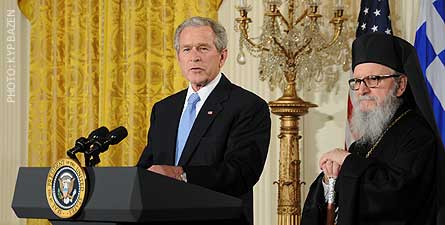
By Demetrios Rhompotis
WIn a straightforward manner rarely used by diplomats and politicians nowadays, Archbishop Demetrios of America, taking advantage of his warm rapport with President George W. Bush (the president has said the Archbishop “soothes my soul”) used the annual celebration of Greek Independence Day this past March 25 at the White House to deliver some unequivocal messages to the seat of power on behalf of American and global Hellenism.
“This very same Greek nation, in a series of sensitive national issues, receives by some nations treatment which is unjust by any standards. The issues of the reunification of Cyprus and of the name of the Former Yugoslav Republic of Macedonia, for instance, are two characteristic examples of this,” the Archbishop, Macedonian himself, said. “Speaking rather boldly, on this solemn day, we express our firm conviction that you will exercise your unique authority and leadership in order to facilitate a course of action that will treat sensitive issues related to Greece in a fair and dignified way.”
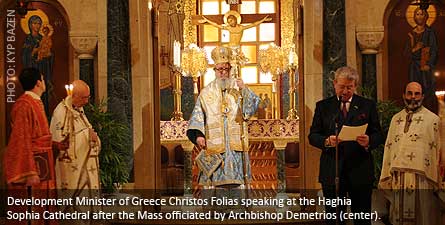
And reminiscent of the noblest figures of the Greek Orthodox clergy at times of extreme hardship, the Primate of the Greek Orthodox Catholic Church in America and a former Harvard Professor, reminded the leader of “the free world” that “Greece is not seeking special favors of unreasonable deference …The Hellenic nation is a proud and honorable nation, a faithful ally of the United States for generations, and throughout its long history has established, as a fact, that it does not depend on favors, but on justice and respect.”
“I’m always open for a few suggestions (laughter). You are an easy man to listen to,” said President Bush, opening his remarks, and although somehow taken aback, seemed to appreciate the Archbishop’s frankness and to feel quite at ease among more than 200 Greek-Americans from all over the country.
Development Minister Christos Folias who crossed the Atlantic especially for the occasion, represented Greece, along with Ambassador Alexandros Mallias. Ambassador Andreas Kakkouris of the Republic of Cyprus was there on behalf of the other Hellenic state.
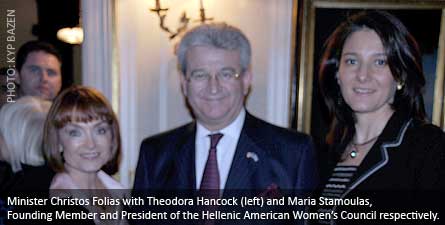
“The White House is a great symbol for independence and freedom and liberty, and it’s a fitting place to celebrate the independence of Greece,” George Bush declared. “All free people stand on the shoulders of Greece. In the ancient world where political power usually came from the sword, the people of Athens came together around a radical and untried idea that men were fit to govern themselves. It was this freedom that allowed them to create one of the most vibrant societies in history. And that society deeply influenced America’s founding fathers when they sought to establish a free state centuries later.” He went on to remind that “liberty only survives when brave men and women are ready to come to its defense. In the years leading up to Greece’s war of independence, one of the rallying cries of the Greek people was that it was better to be free for an hour than to be a slave for 40 years. Those were the kinds of folks who had their priorities straight.”
Speaking of the Greek-American community, President Bush who counts many supporters, among them Alex Spanos, number one financial contributor to his presidential campaigns in the entire country, said that “today more than 1.3 million Greek-Americans trace their ancestry back to Greece and we’re better off for having them here …In celebrating Greek Independence Day, we commemorate the heritage of freedom both our countries hold dear, and we remember the Greek-Americans whose strong spirit, resolve and courage helped create America.”
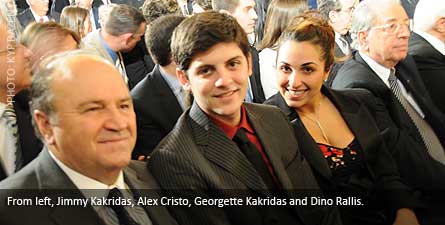
Among the about 200 guests were former US Senator Paul Sarbanes, former US Ambassador to Belgium Tom Korologos, US Envoy to Sudan Andrew Natsios, Dr. John Brademas, President Emeritus of NYU and first Greek-American to be elected in Congress, Ted Spyropoulos, Coordinator for the Council of Hellenes Abroad USA, Emmanuel Velivassakis, President of the Hellenic American National Council, Panicos Papanicolaou, President of the Cyprus Federation of America, Ike Gulas, the Order of AHEPA Supreme President, Karen Stamatiades, Daughters of Penelope Grand President, Gene Rossides, founder and Chairman of the American Hellenic Institute, Andrew Athens, President of the United Hellenic American Council and the very Reverend Alex Karloutsos, whom President Bush greeted personally during his address.
The annual celebration of Greek Independence Day at the White House was established after an initiative by the late Archbishop of North and South America Iakovos. Every year, every American president since, has offered the nation’s recognition to the contributions of the millions of Greeks in every field and sphere of the American life and society. It also underscores the exceptionally important political influence of the Hellenes in the American political scene, expressed not only in votes and financial contributions but in key figures at every level of power. Moreover, it is an opportunity to stress the close relationship between the US and Greece, a staunch ally at every major war America was involved.
“Today, our nations remain allies in the cause of freedom, and are working to lay the foundations of peace and to spread the blessings of liberty around the world,” President Bush said, who despite his tight schedule devoted to the event almost an hour.
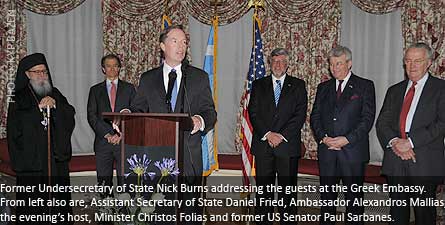
The program concluded with the Archdiocesan Metropolitan Youth Choir, led by Maria Koleva and accompanied by classical pianist Arete Giovannou, performing American and Greek songs in the presence of President Bush and with Archbishop Demetrios translating for him the Greek lyrics.
Earlier in the day, a Mass and a commemorative Doxology for the Anniversary of Greek Independence was celebrated in Washington’s Greek Orthodox Cathedral of Haghia Sophia. Minister Christos Folias was the keynote speaker.
In the evening, Ambassador Alexandros Mallias hosted a reception at the Greek Embassy which former Undersecretary of State Nicholas Burns attended, among numerous dignitaries. In his brief remarks – partly in Greek – Mr. Burns who served as US Ambassador in Athens, reminded that the spread of Greek civilization started with Philip and Alexander of Macedon, resetting the record straight and receiving the warmest of applause of the more than 150 Greek and non Greek guests who had filled the Greek Embassy’s reception halls to capacity.